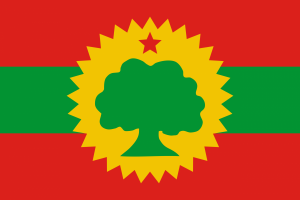Difference between revisions of "Language/Borana-arsi-guji-oromo/Grammar/Conditional-Mood"
m (Quick edit) |
m (Quick edit) |
||
| Line 7: | Line 7: | ||
__TOC__ | __TOC__ | ||
<span link>After mastering this lesson, these related pages might interest you: [[Language/Borana-arsi-guji-oromo/Grammar/Questions|Questions]] & [[Language/Borana-arsi-guji-oromo/Grammar/Future-Tense|Future Tense]].</span> | |||
== Overview == | == Overview == | ||
The conditional mood is formed by adding the suffix -e to the verb stem. For example, the verb "to go" is "dhabe" in the present tense, and "dhabee" in the conditional mood. | The conditional mood is formed by adding the suffix -e to the verb stem. For example, the verb "to go" is "dhabe" in the present tense, and "dhabee" in the conditional mood. | ||
| Line 33: | Line 35: | ||
<hr>If you have any questions, please ask them in the comments section below.<br>Feel free to edit this wiki page if you think it can be improved. 😎 | <hr>If you have any questions, please ask them in the comments section below.<br>Feel free to edit this wiki page if you think it can be improved. 😎 | ||
==Other Lessons== | |||
== | |||
* [[Language/Borana-arsi-guji-oromo/Grammar/Negation|Negation]] | * [[Language/Borana-arsi-guji-oromo/Grammar/Negation|Negation]] | ||
* [[Language/Borana-arsi-guji-oromo/Grammar/Plurals|Plurals]] | * [[Language/Borana-arsi-guji-oromo/Grammar/Plurals|Plurals]] | ||
| Line 46: | Line 46: | ||
{{Borana-arsi-guji-oromo-Page-Bottom}} | {{Borana-arsi-guji-oromo-Page-Bottom}} | ||
<span links></span> | |||
Latest revision as of 20:59, 27 March 2023
Hi Borana-Arsi-Guji Oromo learners! 😊
In today's lesson, we will be discussing the conditional mood in Borana-Arsi-Guji Oromo. The conditional mood is used to express a hypothetical situation or an event that could happen in the future. It is also used to express wishes and requests.
After mastering this lesson, these related pages might interest you: Questions & Future Tense.
Overview[edit | edit source]
The conditional mood is formed by adding the suffix -e to the verb stem. For example, the verb "to go" is "dhabe" in the present tense, and "dhabee" in the conditional mood.
The conditional mood can also be formed by using the verb "to be" (boode) followed by the infinitive form of the verb. For example, "I would go" is "Ani boode dhabu" in Borana-Arsi-Guji Oromo.
Uses[edit | edit source]
The conditional mood is used to express hypothetical situations or events that could happen in the future. For example:
- If I had enough money, I would buy a car. - Ani hadhaa qarshii boode, ani gaarii dhabu.
- If it rains tomorrow, we will stay home. - Hadhaa bishaan roobee boode, ani garaa guddaa jirra.
The conditional mood is also used to express wishes and requests. For example:
- I wish I could go to the beach. - Ani rakkoo ani dhabu kanneen keessatti.
- Please help me if you can. - Fakkeenyaaf, hadhaa kanaan boode, ani gargaarsa.
Examples[edit | edit source]
Here are some examples of sentences in the conditional mood:
- If I had time, I would visit my family. - Ani waqti boode, ani qabeenyaa irraa dhabu.
- If I had money, I would buy a house. - Ani qarshii boode, ani gandaa dhabu.
- If I had a car, I would drive to the city. - Ani gaarii boode, ani magaalaa keessatti dhabu.
- If I had a job, I would work hard. - Ani shaakala boode, ani ajjeechaa dhabu.
If you have any questions, please ask them in the comments section below.
Feel free to edit this wiki page if you think it can be improved. 😎
